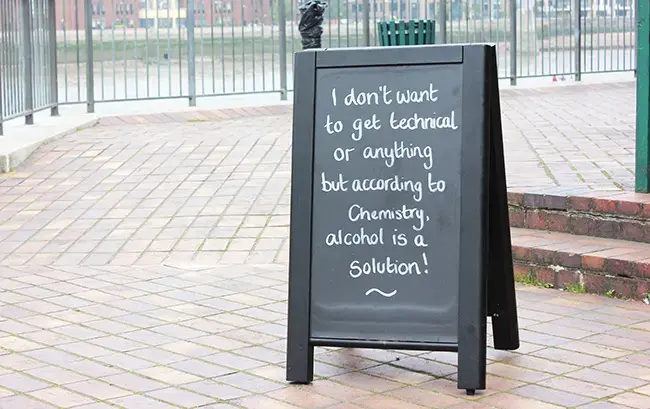There is something comforting about the Prince Bonaparte, a pub situated in the quaint London neighborhood of Notting Hill. Perhaps it's the rustic furniture, the antique table lamps and the floral wallpaper that make one feel at home. It could be the comfort of the menu featuring English cuisine such as pig trotters and bacon on toast. Whatever the reason, this place is a go-to for neighborhood locals.
The Prince Bonaparte is not alone. As Big Ben is heard around London declaring 6 pm, people in every borough from Shoreditch to Notting Hill make their way from work to their local watering hole. Many without extended daycare simply bring their children into the bar—now an accepted social norm.
What comes next is several hours of marathon drinking. On the evening I visited, patrons who've had too much step into the alley to vomit.
According to Public Health England, an agency of the U.K. Department of Health, this kind of alcohol misuse is linked to a range of health disorders, including high blood pressure, heart disease, stroke, liver disease, some cancers, and depression. "It is imperative we change attitudes and behaviors towards alcohol to avoid the drinkers of today becoming the future alcohol-related death statistics. Education has a key role to play so it's important that the government, public health community, drinks industry and voluntary sector work in partnership to address this," says Elaine Hindal, chief executive at the alcohol education charity Drinkaware.
Alcohol consumption is a way of British life that has deep historic roots going back to before the 18th century. In 1694 consumption was so high, the Bank of England, which was created to help fund wars, lent the government money because it knew there were guaranteed returns based on the large potential revenue of taxes on alcohol.
Alcohol-related problems have deep roots as well. The Gin Craze was a period of time in the early 18th century, when drinking gin increased rapidly in Great Britain, particularly in London. Along with higher consumption rates came increased crime and mortality rates. The British government implemented the Acts of 1736 and 1751, which added taxes and license fees, in an attempt to control the drinking.
Though it appears to be ancient history, in present day U.K. alcohol has been related to major health concerns, including rapidly growing obesity rates. It has become a topic of concern for the government, media, and academics. The Foresight Report, issued by the U.K. government in 2007, predicted that half the population could be obese by 2050. The National Obesity Forum, founded to raise awareness of obesity, has since determined that upward trends in obesity levels suggest these conclusions could be exceeded.
Studies have shown a link between the regular consumption of alcohol and weight gain. In 2014, the Royal Society of Public Health (RSPH), an independent charity dedicated to improving the public's health and well-being, called for labeling on alcoholic drinks. "The campaign was driven by research showing the public was unaware of the calories in their drinks. It has been estimated that of adults who drink, over 10 percent of their daily calories come from alcohol," says communications manager Kate Sanger. "We think the public should be aware of what they are consuming—calorie content, health risks, etc., and then be able to make an informed decision."
The European Union has not reached a decision on the labels, but Sanger vows, "We will be continuing the campaign throughout the year. We work with a variety of organizations and partners who are supportive of the move including the Alcohol Health Alliance and Department of Health. And we will continue to work with them on this issue in addition to other health concerns surrounding alcohol."
Hindal agrees: "We support any initiative which educates people about the calories in alcoholic drinks. A lack of awareness of the calorie content of alcohol and the fact that alcohol contains almost as many calories as pure fat can inadvertently hamper people's efforts to lose weight and stay in shape." She adds, "This highlights the importance of helping people realize just how many calories are in their glass, so they can make an informed choice about how much they drink."
Drinkaware is taking steps of their own. In August 2014, they launched a mobile app, which enables people to track their alcohol consumption, calculate units and calories, and set goals to moderate or stop their drinking. "This app has been designed to help people change their drinking by providing support and encouragement in a non-judgmental way at times and locations people need it most," says Ben Butler, head of the digital division. "Our app helps people to make positive changes in their relationship with alcohol, so they can start to enjoy the health benefits of cutting down or giving up."
A number of other initiatives have been called for, including sobriety tags, worn around the clock by those on probation measuring their perspiration and alerting their probation officer if any alcohol is detected. Other initiatives, such as banning alcohol advertising at sporting events and setting up checkpoint type booze borders around city centers so as to refuse entry to anyone who is drunk, are also being considered. But as the battle wages on, alcohol is so ingrained in British culture and attitudes, it's hard to imagine winning this war.













